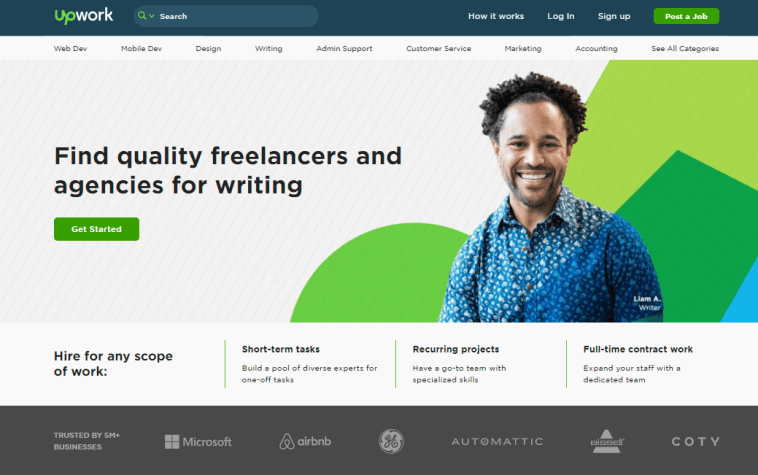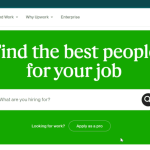Introduction.
When it comes to freelancing on Upwork, the way you showcase your skills and expertise can make or break your chances of landing that perfect project.
Your profile description isn’t just a place to list skills—it’s a way to help clients understand why you are the right fit for their project, especially when they’re choosing between several candidates with similar backgrounds.
If you’re not careful, your profile can end up looking like a collection of buzzwords or, even worse, a generic list that doesn’t reflect your true potential.
A well-crafted description, on the other hand, is like your personal ad space; it’s a chance to stand out and give clients a sense of who you are, what you bring to the table, and why you’re worth hiring.
In this post, we’ll cover the ins and outs of describing your expertise on Upwork so you can create a profile that works as your best sales pitch.
Why Your Profile Description Matters on Upwork
Your profile description is often the first impression clients have of you, making it one of the most critical parts of your Upwork presence.
Since Upwork is a competitive marketplace, there’s a need to be strategic with every word you use to capture a client’s attention quickly.
This doesn’t mean making your description flashy or over-the-top; instead, it’s about communicating your expertise clearly and effectively, emphasizing what sets you apart. With the right approach, you can attract high-quality clients who see the value in your unique skills.
How Do I Describe My Expertise On Upwork?
To get clients interested in your profile, you’ll want to focus on clarity, relevance, and confidence. Here are some steps to ensure your expertise shines through in a way that appeals to clients.
1. Know Your Audience.
Before you start writing, think about the types of clients you want to attract. Are they small business owners looking for cost-effective solutions, or larger companies needing specific expertise?
Tailor your description to the types of clients you hope to work with by addressing their likely needs and pain points.
2. Showcase Your Core Skills—Don’t List Everything.
Think quality over quantity when it comes to listing your skills. Rather than adding every skill you’ve ever picked up, focus on a few core skills that you excel at and can demonstrate with real-life examples.
If you’re a graphic designer, focus on your proficiency in Adobe Creative Suite or web design; if you’re a writer, emphasize your experience in content marketing or copywriting.
3. Back Up Your Claims with Experience.
Clients want to see evidence that you know what you’re talking about. Rather than just saying, “I’m great at SEO,” try something like, “With over three years of experience in SEO, I have helped companies increase their organic traffic by up to 30%.” Providing specifics like this makes you seem more credible and reassures clients that you have a track record.
4. Highlight What Makes You Unique.
Take a moment to think about what sets you apart from others in your field. This could be a specific technique, a niche area of expertise, or a unique combination of skills that makes you particularly valuable.
Adding a sentence like “My experience in both UX design and front-end development allows me to create sites that are both user-friendly and technically sound” can be a game-changer.
5. Use Simple, Friendly Language.
Avoid technical jargon or complicated terms, especially if they’re not necessary for the type of clients you’re aiming to attract.
Your goal should be to communicate your skills in a way that’s easy for anyone to understand, even those without industry knowledge.
Using simple, clear language also helps clients feel more at ease and confident about working with you.
6. Include a Brief Summary of Your Personality and Work Style.
Clients want to hire people they’ll enjoy working with, so feel free to add a bit about yourself beyond your skills.
This could be a quick sentence about your approach to work, your commitment to meeting deadlines, or how you tackle complex projects.
A description like, “I take pride in delivering high-quality work on time and enjoy collaborating to meet project goals,” goes a long way in showing you’re professional and easy to work with.
7. Make It Action-Oriented.
Use action words like “create,” “build,” “design,” or “write” to give your profile an active tone. Instead of passively listing your skills, describe what you do with those skills.
For example, “I design user-friendly websites that help businesses attract more customers” sounds more dynamic and purposeful than just saying “web designer.”
Pros and Cons of Highlighting Certain Skills
Pros
- Niche Expertise Can Be a Selling Point
Highlighting specific, in-demand skills (e.g., data analysis for e-commerce, UI design for mobile apps) can attract clients with specialized needs, increasing your chances of landing well-paying projects in those niches. - Helps Weed Out Irrelevant Job Offers
A clear profile can save time by attracting relevant clients and reducing proposals for projects that don’t align with your strengths.
Cons
- Potential to Limit Your Audience
Focusing too heavily on niche skills can make it seem like you’re only interested in very specific projects, potentially deterring clients with broader needs. - Risk of Appearing Overconfident
Overstating your skills or experience can lead to unrealistic client expectations, which may backfire if a project doesn’t go as planned.
FAQs
Q: How long should my profile description be?
A: Aim for 200–300 words. This length is long enough to provide detail but short enough to keep clients’ attention.
Q: Can I mention previous clients or companies I’ve worked with?
A: Yes, as long as you’re not violating any confidentiality agreements. Mentioning well-known clients or brands can add credibility, but be mindful of NDA restrictions.
Q: Should I include personal details or hobbies?
A: Stick to professional details or soft skills relevant to the job. While some personal touch can help, keep the focus on qualities that would benefit a client directly.
Q: Do I need to update my description regularly?
A: Absolutely. Update your profile whenever you gain new skills, complete impressive projects, or pivot your focus.
Q: How do I handle areas where I’m less experienced?
A: Highlight your strengths while keeping things honest. If you’re learning a new skill, consider adding it to the bottom of your description as a “developing area” rather than focusing on it.
Wrapping It All Up
An effective Upwork profile description should be clear, concise, and focused on the unique value you bring to clients.
By choosing your words carefully and being specific about your experience, you can build trust with potential clients, ultimately helping you stand out in a crowded marketplace.
A little bit of planning goes a long way here—your description could be the reason a client reaches out to you for their next big project.
So, are you ready to go update your Upwork profile and put your best foot forward?





GIPHY App Key not set. Please check settings